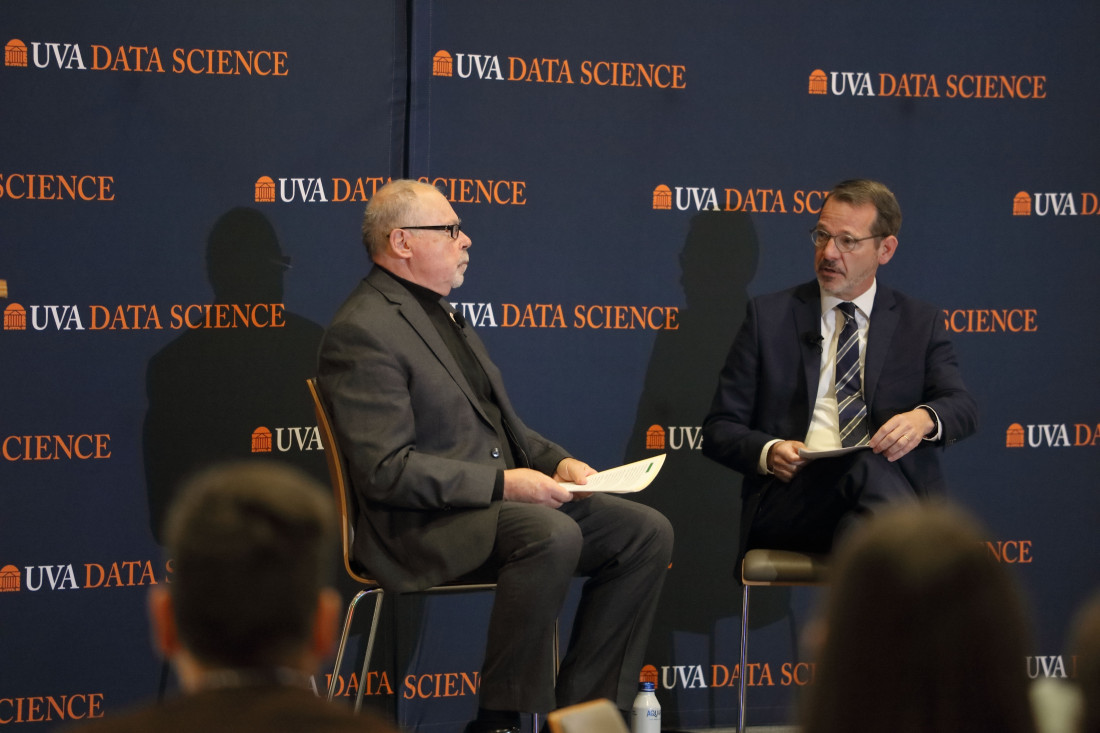UVA Launches Futures Initiative to Chart Next Decade in Higher Ed

With an eye toward a decade ahead that promises change, opportunity, and challenge, the University of Virginia on Friday launched its Futures Initiative to help plan for the next 10 years in higher education.
Over the next year, a group of thought leaders from across the University, known as the Futures Initiative Group, will examine the current drivers of change in academia, such as artificial intelligence and large language models like ChatGPT, while also looking ahead to the eventual impact of sensor technology, virtual classrooms, the Internet of Things, and myriad other technological changes.
The goal of the initiative -- which was announced at Datapalooza 2023, an annual event hosted by the School of Data Science -- is to develop a series of recommendations, which will be delivered to University leadership, on how to chart a path forward so that UVA can be proactive, rather than reactive, to external events. The project will complement the University’s 2030 Plan, the strategic vision laid out by President Jim Ryan that is guided by the belief that UVA should aim to be both “great and good.”
“The Futures Initiative will position the University to continually scan the academic and technological landscapes in search of opportunities to accelerate progress toward our strategic goals or to approach them in new ways,” said Executive Vice President and Provost Ian Baucom.
The idea was developed by Phil Bourne, founding dean of UVA’s School of Data Science; Christa Acampora, dean of the University’s College and Graduate School of Arts & Sciences; and Ken Ono, a professor of mathematics and STEM advisor to the provost who also holds an appointment with the School of Data Science
“I’m grateful to Deans Bourne and Acampora, as well as to Professor Ken Ono, for taking the lead on this important, forward-looking initiative,” said Ryan.
“Rapid technological change and complex global challenges in the years ahead require us to look beyond the immediate horizon, and UVA is fortunate to have outstanding scholars and leaders focused on this work,” he added.
Specific proposals to address these challenges that may emerge from the initiative’s discussions could include faculty hires, new research programs, or multi-institutional initiatives. The guiding principle for any new action would be how to best position the University for success over the next five to 10 years.
“Based on that premise, we could actually go backwards and make some decisions today to move toward that future,” said Bourne.
The swiftness of technological change occurring at the same time as existential threats such as climate change and global conflict underscore why this effort is so urgent, according to the initiative’s founders.
“To understand, adapt, and solve these urgent problems, UVA will need to realize even greater interdisciplinarity across academic fields, including what we research and how we approach it,” said Acampora. “The liberal arts and sciences are crucial for this project because—now more than ever—we need a more capacious understanding of what is human, more than human, and humane.”
As part of the project, the Futures Initiative will launch a series of podcasts highlighting different topics that are likely to play a pivotal role in shaping the future of higher education. Guests are expected to include futurists, business leaders, scientists, and college presidents. Other planned activities include town halls with similar diverse panels aimed at advancing the dialogue around the future of UVA across the University.
“With fewer students attending college than a decade ago, and fewer employers requiring college degrees, one might ask whether university education will remain relevant in the future,” said Ono. “Our aim is to not only help UVA lead the way into the future, but to also imagine a future where university education is more relevant than ever.”
As with any effort to project into the future, Bourne acknowledged the initiative will not always get it right. But, he believes, their work will leave the University “in a better place.”
“Let’s move it forward and see what comes of it,” he said, adding that the group’s recommendations will ultimately be based on “a broad spectrum of people who are interested in the future of UVA.”